
Professor Jens Holscher co-authored a new BAFES17 RePec Working Paper: https://econpapers.repec.org/paper/bamwpaper/bafes17.htm
Latest research and knowledge exchange news at Bournemouth University

Professor Jens Holscher co-authored a new BAFES17 RePec Working Paper: https://econpapers.repec.org/paper/bamwpaper/bafes17.htm
 Innovate UK have announced that £300m will be available to businesses and researchers to address the challenges facing our ageing population. Some £98m of this funding will be reserved for research and innovation that supports the care and health of people as they age. A further £198m will become available to support the use of early diagnosis innovation and the development of precision medicine.
Innovate UK have announced that £300m will be available to businesses and researchers to address the challenges facing our ageing population. Some £98m of this funding will be reserved for research and innovation that supports the care and health of people as they age. A further £198m will become available to support the use of early diagnosis innovation and the development of precision medicine.
This funding will be available from UK Research and Innovation with the challenges running in 2018 and 2019. As the opportunities become available, please contact Ehren Milner (emilner@bournemouth.ac.uk) if you have any queries.

Professor Jens Holscher has joined the review team of the ‘International Small Business Journal’.
The deadline for student applications for the SRA Scheme has been extended to 2nd April 2018. The summer programme is for 120 hours work between late May and 31st July 2018 and is open to all campus-based undergraduate and postgradaute-taught students from all faculties who have grades of over 70%. Students can apply via MyCareerHub using the links below.
2D/3D Animation Tool Developer – Student Research Assistant – Dr Xiaosong Yang
An analysis of Channel 4’s broadcast coverage of the 2016 Rio Paralympics – Student Research Assistant – Dr Dan Jackson and Dr Emma Pullen
Augmented Reality Student Research Assistant – Dr Tom Wainwright
Blockchain and its potential to transform business operating models in tourism and hospitality – Student Research Assistant – Dr Viachaslau Filimonau
CAIRIS Research Software Engineer – Student Research Assistant – Dr Shamal Faily
Creating a citizen science website for identifying wildlife habitats: Wildlife Space Search (WiSS) – Student Research Assistant – Dr Anita Diaz
‘Debt Financing Impact – Family Firms UK’ Student Research Assistant – Dr Suranjita Mukherjee
Digital connectivity and leisure in later life – Student Research Assistant – Prof. Janet Dickinson
Entrepreneurial Graduates Student Research Assistant – Clive Allen
Evaluator for children’s emotional education and well being – Student Research Assistant – Dr Ching-Yu Huang
Facebook Personalisation and Digital Literacy (Algorithms and Fake News) – Student Research Assistant – Dr Roman Gerodimos
Student Research Assistant: Food donations in the UK grocery retail sector – The role of local charities – Dr Viachaslau Filimonau
Food waste collection and recycling by local councils in England: identifying ‘best practice’ models – Student Research Assistant– Dr Viachaslau Filimonau
‘Housing Information Retrieval System’ Student Research Assistant – Dr Edward Apeh
HTML5 Game developer – Student Research Assistant – Dr Vedad Hulusic
Inter-professional attitudes and beliefs about pain management: support to write a research paper – Student Research Assistant – Dr Desiree Tait
Low power IoT devices for Network Visuals – Student Research Assistant – Liam Birtles
Marketing & Economic Well-being Student Research Assistant – Prof. Juliet Memery
Marketing and Media Student Research Assistant – Dr Tom Wainwright
Modelling and System design for Intellectual Property law application – Student Research Assistant – Dr Sofia Meacham
M-shopping and senior consumers: A multi-method investigation into attitude and shopping process – Student Research Assistant – Dr Jason Sit
Older carers story project research assistant post – Student Research Assistant – Dr Mel Hughes
Public Engagement Student Research Assistant (Virtual Avebury) – Prof. Kate Welham
Public Service Motivation and Civic Engagement – Student research Assistant – Dr Joyce Costello
Quantifying Dyslexic Performance in Classroom Copying Tasks – Student Research Assistant – Dr Julie Kirkby
Reconstructing Disney Films – Student Research Assistant – Dr Alexander Sergeant
Student Research Assistant for a Political Anthropology Project on Gibraltar & Spain – Dr Laura Bunt-MacRury
Research Assistant: Economic Impact of the Rohingya Refugee Crisis – Dr Mehdi Chowdhury
Student Research Assistant in Managing Crises and Disasters at International Sport Events – Dr Richard Shipway
Student research assistant to support the development of a change framework for Higher Education – Dr Lois Farquharson
Researching the role of public engagement events to increase understanding of financial scams – Student Research Assistant– Dr Sally Lee and Prof. Lee-Ann Fenge
Student Research Assistant to The TACIT Trial: TAi ChI for people with demenTia – Dr Samuel Nyman
Story-mapping Marginal Voices: Using Modes of Interactive Storytelling – Student Research Assistant– Dr Paula Callus
AI and Business Applications – Student Research Assistant – Dr Martyn Polkinghorne
Public Engagement Activities of Postgraduate Researchers – Student Research Assistant – Dr Martyn Polkinghorne
Entrepreneurship Education – Student Research Assistant – Dr Mili Shrivastava
Student Research Assistant (micro-plastics and disease dynamics) – Prof. Robert Britton
Student Research Assistant in Law & AI – Dr Argyro Karanasiou
The effect of signage on driving performance: Student Research Assistant – Dr Christos Gatzidis
The material culture of mantelpieces as expression of self-identity – Student Research Assistant– Dr Fiona Coward
Traveling with Diabetes – Student Research Assistant– Prof. Dimitrios Buhalis
Understanding the Hackers: Student Research Assistant – Dr John McAlaney
‘Who’s a scientist?’ Project Student Research Assistant – Dr Shelley Thompson
Team-based Learning Student Research Assistant – Lucy Stainer
‘TRAnsparent Web protection for alL, TRAWL’ Student Research Assistant – Dr Alexios Mylonas
Research Assistant: UK on the European and International Stage – Dr Sangeeta Khorana
Research Assistant in Entrepreneurship – Dr Thanh Huynh
Student Research Assistant in two-dimensional oxides – Dr Amor Abdelkader
Electrochemical remediation of contaminated soils – Dr Amor Abdelkader
“Institutions, Regulations and Performance” Student Research Assistant – Dr Khurshid Djalilov
Please encourage your students to apply. All jobs are live on MyCareerHub, our Careers & Employability online careers tool. You will need to use your staff/student credentials to login.
If you have any questions about th scheme, please contact Charlene Parrish, Student Project Bank Coordinator, on 61281 or email sra@bournemouth.ac.uk.
A Journalism Research Group research seminar. 3pm – 4.30pm, Wednesday 21 March in WG04.
After years of trial and error, Roman will share some thoughts and tips on how to do research, focusing on the main challenges of staying focused and becoming more productive. He will demonstrate some of the tools and routines he uses to organise his tasks, readings, notes and writing, as well as a few mental strategies on overcoming sticking points. This session is open to all within and outside JEC (including PhD students) but we envisage it as an interactive workshop-type session, in which colleagues will share their own thoughts, anxieties and practical tips.
The session is led by Dr Roman Gerodimos, Faculty of Media and Communication.
What are these sessions about?
They focus on the process of doing research rather than presenting the outcomes. They are less masterclass talks and more quality circles, where we all bring our research questions, dilemmas and dead-ends to the sessions. Whilst there will be someone leading the seminar, they are designed to be participatory.
Spaces are limited, so please email jacksond@bournemouth.ac.uk if you intend to come.
For more information about the Journalism Research Group (JRG) visit the CSJCC website: https://research.bournemouth.ac.uk/centre/journalism-culture-and-community/
All welcome. Hope to see you there.
Last week Sacha Gardener reported on this BU Research Blog on the publication of our most recent article ‘Why suicide rates among pregnant women in Nepal are rising’ in The Conversation. Since then we have been informed that this piece was reproduced in two Indian independent online newspapers, last week in The Wire and today in Scroll.in (India’s leading independent source of news, analysis and culture). Scroll.in used the heading ‘A project is training midwives in Nepal to stem rising suicides of pregnant women’, whilst The Wire used the title ‘Why Suicide Rates Among Pregnant Women in Nepal Are on the Rise’. Suicide in pregnant women and soon after birth is an important issue in both Nepal and India. Just for completeness the original article, written by BU’s Visiting Faculty Dr. Bibha Simkhada and Prof. Edwin van Teijlingen based in BU’s Centre for Midwifery, Maternal and Perinatal health (CMMPH), can be found here!
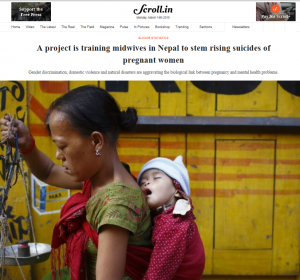
BU welcomed Sam Gyimah MP on Thursday as part of his #SamOnCampus tour. Wearing his Science, Research and Innovation hat, we started with a whistle-stop tour of some interesting projects with a focus on technology and priorities for the Department of Business, Energy and Industrial Strategy. The Minister was keen to be hands on simulator for knee operations with Dr Tom Wainwright from the Orthopaedic Research Institute, and tried out the eye tracking technology with Dr Sarah Bate from the Centre for Face Processing Disorders. He also discussed virtual reality and wayfinding in care homes with Professor Jan Wiener, the AfterGlow project with Vicky Isley and Paul Smith and discussed technological innovations in learning with Professor Elizabeth Falconer. The Minister then heard about BU from Professor John Vinney and Jim Andrews, and was interviewed by two of our BA Multimedia Journalism students. He then helped to break the ground for our Poole Gateway Building.
The main event was the #SamOnCampus event – billed as a dialogue between Sam and students and staff. The event was hosted by Alex Hancox, SUBU VP education with a welcome from the VC, Professor John Vinney and Daniel Asaya, President of SUBU. The Minster, who has called himself the “Minister for Students” and who started by saying that the HE sector has changed and that it is time for students to have a voice, was keen to discuss a wide range of issues, and as well as questions about higher education and fees and funding, a wide range of issues did indeed come up. It would probably fair to say that the Minister supported the government line on these issues (ie. austerity is not a belief system, it’s a necessity and homelessness is a priority issue that needs to be addressed). NB local MP Conor Burns later issued a call to action on homelessness locally so it will be interesting to see where this goes).
The Minister asked the audience several questions, including what their priorities would be if they had his job. He also stayed for some time afterwards chatting to students.
The Minister gave the impression of genuinely wanting to hear what students had to say and was keen to engage and respond, not afraid to give potentially unpopular responses – but he did not have answers to all the questions and did not engage in detail on some of the issues that are important to students – e.g. mental health. It will be interesting to see if there is any follow up on these issues and what the Minister takes away from his tour overall.
On Monday last week the Department for Education announced a 10 week consultation on the subject level TEF – see the press release. The Times Higher published an article.
Consultation questions include:
We’ll be preparing a response to this so please contact policy@bournemouth.ac.uk if you would like to be involved.
In a related announcement, the Minister will also launch an Open Data competition, the first of its kind in the UK HE sector, which will use selected government data on universities so that tech companies and coders can create apps to help prospective students decide where to apply. This competition will build on the government’s recently published Longitudinal Education Outcomes (LEO) dataset, which gives information on employment and salaries after graduation. By democratising access to information about courses and their outcomes, it will help all applicants, regardless of their background, make better decisions and get better value for money. The Universities Minister added:
Timely for the HE review, a report from Million Plus on “Forgotten Learners: Building a system that works for Mature students”. Recommendations are that:
The Government should:
The OfS should:
Universities should:
Research Professional had an article on the UK being frozen out from EU agencies and research post Brexit. The EU has apparently said that participation in things such as the European Medicines Agency is “cherry picking” and unacceptable – will they take the same view on Erasmus? There are separate guidelines on research frameworks which say that the UK would be treated as a third country, can only take part if we make a net contribution and give up decision making powers. The UK currently benefits, taking 40% more out than it puts in, so that looks unhelpful too as an approach.
Please find below initial headlines from today’s Spring Statement, the following links provide a good overview:
After reflecting on the growth and public finance projections, the Chancellor said at the Autumn Budget he would set a path for spending from 2020, with a Spending Review taking place in 2019. He indicated that if in the Autumn the public finances continued to reflect improvements, the Treasury would be able to increase public spending.
Other announcements included:
The Office for Fair Access (OFFA) has published an impact review by Nursaw Associates which has found that “our approach to research and evidence has been successful in helping higher education providers to improve access to and participation in higher education by working in more effective ways”. The document can be found on the OFFA website.
Taking an evidence-led approach to access and participation- “You cannot regulate if you do not understand.” – Academic interviewee In September 2017, we commissioned Nursaw Associates to carry out an impact review of how far the activities of our Evidence and Effective Practice function have successfully met the objective of our Evidence Strategy to support and challenge the sector to continually improve outcomes through the generation of and learning from robust evaluation, research and analysis.
This impact review has demonstrated that:
Why did we do this? – Our 2015-2020 Strategic Plan called for universities and colleges to take an increasingly evidence-led approach to improving performance on access and participation across the whole student lifecycle – from entry right through to the transition to work or further study. Alongside this challenge to institutions, we have also been developing a more evidence-led approach to our own policy and practice. This impact review forms part of our commitment to more intelligent regulation, and was intended to:
What did we find?
Support and challenge – In the minds of institutions, there is significant interdependence between OFFA’s evidence and effective practice work and its regulatory function, with 81 per cent of survey respondents considering that OFFA’s role should be to both regulate higher education and support the sector in its efforts to widen participation.
The value of research to institutions – Survey and interview responses highlighted that OFFA’s research and evaluation work is valued by institutions in terms of:
Widening participation staff felt that OFFA enabled them to influence leaders to understand the importance of their work, and would like OFFA to be more visible in the practitioner community, for example via targeted events and direct communications.
Case study: understanding the impact of financial support – Our research to understand the impact of financial support has led to significant change, with over 57 per cent of institutions from the access agreement analysis using the financial support toolkit developed through this work.
Relationship building – 88 per cent of survey respondents described having a close working relationship with OFFA, which was seen as positive and important for effective regulation. Interviewees from further education colleges (FECs) reported feeling more distant from OFFA, explaining that they don’t consider a close relationship with OFFA to be necessary, but would like opportunities to share and discuss best practice with other FECs.
A sea change – Interviewees reported that OFFA has had a positive impact on the sector, with one describing OFFA creating a “sea change”. This is borne out by access agreement analysis which demonstrates a significant increase in evaluative activity within institutions: only 10 per cent of access agreements in 2013-14 mentioned an evaluation framework, which had risen to 57 per cent in 2018-19. However, interviewees widely acknowledged that evidence and evaluation are not yet embedded into the work of the sector and require further support and intervention from the regulator. Many did not believe that the evaluative work would continue at the same level without the commitment and support from OFFA.
Recommendations – The review has provided valuable learning for OFFA as the current fair access regulator, which we hope will be developed by the OfS as the incoming regulator. We encourage the OfS to:
We hope that institutions will:
To subscribe to the weekly policy update simply email policy@bournemouth.ac.uk
JANE FORSTER | SARAH CARTER
Policy Advisor Policy & Public Affairs Officer
Follow: @PolicyBU on Twitter | policy@bournemouth.ac.uk
 It is just over a year until the official Brexit date.
It is just over a year until the official Brexit date. You are invited to attend an informal discussion group on Wednesday, 28th March 2018, to explore what is known about the impact on research and share ideas to mitigate this impact at BU.
During this session, we will consider the latest government updates, keeping up with announcements from UKRO and actions that can be taken now to plan for research activity in this changing environment.
This session will be jointly hosted by Jane Forster (the Vice-Chancellor’s Policy Adviser) and Emily Cieciura (Research Facilitator)
 The awards ceremony for this year’s Research Photography Competition is taking place on Tuesday, 20 March from 1-2pm.
The awards ceremony for this year’s Research Photography Competition is taking place on Tuesday, 20 March from 1-2pm.The winners that you’ve been voting for will be revealed and awarded prizes by Pro Vice-Chancellor for Research and Innovation, Professor John Fletcher.
Come along to the Atrium Art Gallery to see all the photographs in person and find out about the fascinating research behind each one, undertaken by our academics, students across all levels and professional services.
The exhibition is open to all and free to attend so please do come along with colleagues and friends. Nibbles and refreshments will be provided.
Click here to register to attend.
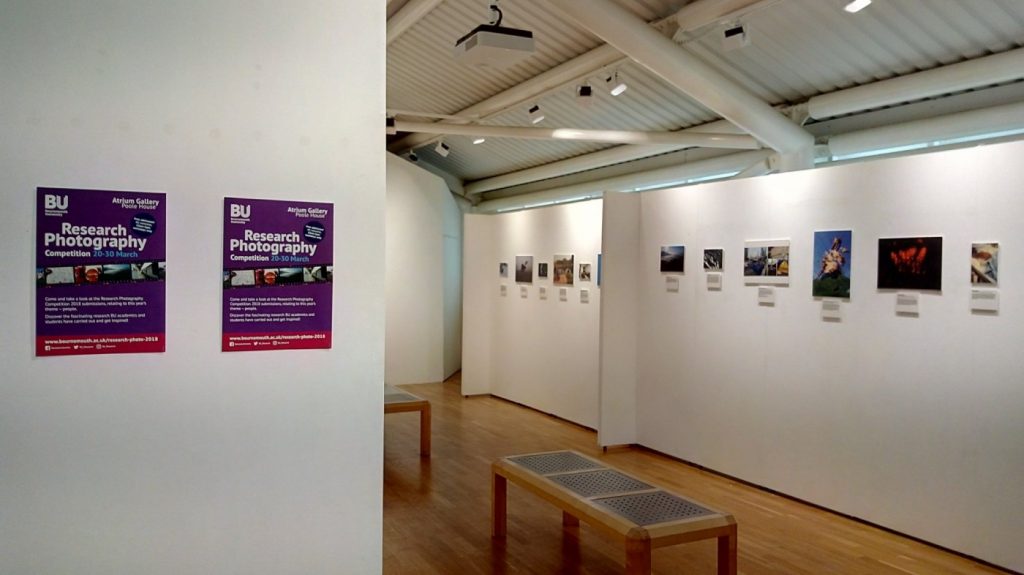
If you’re unable to join us today, the exhibition will be open from 20 March – 29 March (weekdays only) from 10am – 6pm.
Don’t miss out!
The Research and Knowledge Exchange Office (RKEO) through the Research & Knowledge Exchange Development Framework (RKEDF) have a number of workshops in the coming  months to assist you in developing and enhancing the impact that you can make with your research, with particular reference to the REF.
months to assist you in developing and enhancing the impact that you can make with your research, with particular reference to the REF.
Please follow the links above to find out more and to book. You will then receive a meeting request giving the room location. Many of these events have input from external presenters; please ensure that you are in the room and ready to commence at the given start time.
If you would like to discuss impact outside these workshops, please contact the RKEO Knowledge and Impact Team.
Association for Psychosocial Studies Biennial Conference
Bournemouth University, 5th-7th April 2018
‘Psychosocial Reflections on a Half Century of Cultural Revolution’
http://aps2018.bournemouth.ac.uk
A half century after the hippie counterculture of 1967 (‘the summer of love’) and the political turbulence of 1968 (‘May 68’), one aim of this conference is to stage a psychosocial examination of the ways in which today’s world is shaped by the forces symbolised by those two moments. It will explore the continuing influence of the deep social, cultural and political changes in the West, which crystallised in the events of these two years. The cultural forces and the political movements of that time aimed to change the world, and did so, though not in the ways that many of their participants expected. Their complex, multivalent legacy of ‘liberation’ is still developing and profoundly shapes the globalising world today, in the contests between what is called neo-liberalism, resurgent fundamentalisms, environmentalism, individualism, nationalisms, and the proliferation of identity politics.
A counter-cultural and identity-based ethos now dominates much of consumer culture, and is reflected in the recent development of some populist and protest politics. A libertarian critique of politics, once at the far margins, now informs popular attitudes towards many aspects of democratic governance; revolutionary critiques have become mainstream clichés. Hedonic themes suffuse everyday life, while self-reflection and emotional literacy have also become prominent values, linked to more positive orientations towards human diversity and the international community.
The programme is now available on the conference website:
http://aps2018.bournemouth.ac.uk/wp-content/uploads/2018/02/Provisional-Programme.pdf
There are five keynotes and eighty papers, with presenters from all continents, as well as a number of experiential workshops. As well as examining the main theme of societal change, there is an open stream of papers on a wide range of topics. Methods of psychosocial inquiry are applicable to most topics. As an academic community, the psychosocial is a broad church defined only by a commitment to exploring and linking the internal and external worlds – the deeply personal and the equally deeply societal as sources of experience and action.
BU colleagues can attend the whole conference at the hugely discounted rate of £40, or £25 per day.


 Join us for this showcase exhibition and explore the latest postgraduate research emerging from BU. An exhibition of postgraduate researchers’ posters and photographs will be on display at the Atrium Gallery, Poole House, Talbot Campus, from 12 – 16 March 2018, 10am-4pm.
Join us for this showcase exhibition and explore the latest postgraduate research emerging from BU. An exhibition of postgraduate researchers’ posters and photographs will be on display at the Atrium Gallery, Poole House, Talbot Campus, from 12 – 16 March 2018, 10am-4pm.
Free to attend, all welcome.
We are running an exciting Speed Collaboration session on Thursday 22 March, starting at 11.30 and including a networking lunch. It is part of a stimulating Interdisciplinary Research Week program starting next week.
Comments about Speed collaboration/networking events from all over the world:
“It was kind of fun, it was kind of light, it wasn’t highly pressured… It was just ‘Lets see if we can make a connection and then take it further if we need to’.”
“What appealed to me about speed networking was the opportunity to meet a lot of people within a short space of time.”
On 31 January 2018, I attended a Speed networking event run by Innovate UK in London to see what the fuss is all about. They have gone for the structure where there are 5 Challenge 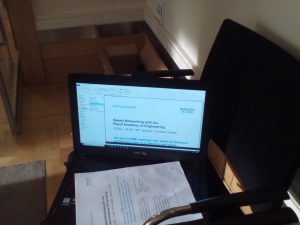 Proposers – Siemens, Deloitte, European Space Agency, Jaguar Land Rover and Reed Smith. The Proposers list their challenges and organisations (about 30 reps attended) apply to pitch their ideas to each Proposer. The Proposers are set up in 5 tables and each organisation is given 5 minutes to present. The Hostess rings a bell and they have to move on to the next Proposer.
Proposers – Siemens, Deloitte, European Space Agency, Jaguar Land Rover and Reed Smith. The Proposers list their challenges and organisations (about 30 reps attended) apply to pitch their ideas to each Proposer. The Proposers are set up in 5 tables and each organisation is given 5 minutes to present. The Hostess rings a bell and they have to move on to the next Proposer.
There was fantastic energy and buzz floating around; and I can feel that definite connections were made. Attend our RKEO Speed Collaboration event and you will find out for yourself how we will be running it and what you can take away from it.
You have to be in it, to win it! A last comment to leave you with:
“It’s a research project that may never have come together, or at least come together as quickly, if it hadn’t been for the speed-networking event. The bottom line is, if you don’t meet people, you will never find someone who can find you new information and a new vision. Breakthroughs can only happen if you acknowledge you don’t know everything.”
All you have to do to book your place is to click here and see what happens next!
On Wednesday 28th February 2018 guest composer Dr Annie Mahtani, University of Birmingham and Birmingham Electroacoustic Sound Theatre (BEAST), joined us for a concert of multi-channel, surround-sound music for Loudspeaker Orchestra in the Allsebrook Lecture Theatre. Organised by Ambrose Seddon (EMERGE; Creative Technology), the varied programme featured works from BEAST and BU composers.
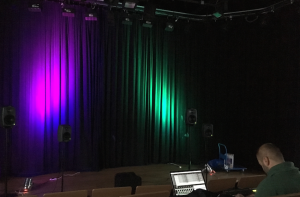
Annie Mahtani presented and diffused three of her own multi-channel compositions (Inversions; Past Links; Aeolian) along with works by fellow BEAST composers James Carpenter (Pent-Up) and Nikki Sheth (Orford Ness). Ambrose Seddon diffused his recent multi-channel electroacoustic work Traces of Play while Panos Amelidis (EMERGE; Creative Technology and pictured sound-checking) diffused two compositions: Bird Train and Cracks.
Student volunteers from our BSc Music & Sound Production Technology provided crucial help rigging the loudspeaker system – they also gained invaluable insights into novel surround-sound loudspeaker configurations.
Thanks to all who attended and persevered despite the cold conditions!
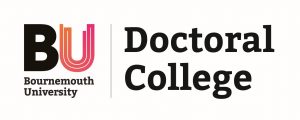
Call for submission of a further 18 matched funded Postgraduate Research Projects for the 2018 BU PhD Studentship Competition is closing soon.
Academic staff are invited to submit proposals for matched funded studentship projects which, if successful, will be advertised to recruit PhD candidates for a September 2018 start.
Full details can be found on the Doctoral College Staff Intranet where the following information can be found:
Submission Deadline:
Applications should be submitted on the Studentship Proposal Form to the Doctoral College via email to phdstudentshipcompetition@bournemouth.ac.uk no later than 5pm on Monday 26 March 2018.
The Doctoral College will manage the recruitment process along the following timetable:
| Date | Action |
| February 2018 | Launch PhD Studentships Internal Competition – development of proposals |
| 26 March 2018 | Closing date for submission of proposals |
| w/c 2 April 2018 | Faculty panel meetings to rank projects |
| w/c 16 April 2018 | Central panel meeting to allocate funding |
| 14 May 2018 | Launch PhD Studentships External Competition – recruitment of candidates |
| 30 June 2018 | Closing date for External Competition |
| September 2018 | Successful Candidates start |
 Have you noticed this box on the BU Research Blog?
Have you noticed this box on the BU Research Blog?
By clicking on this box, on the left of the Research Blog home page just under the text ‘Funding Opportunities‘, you access a Research Professional real-time search of the calls announced by the Major UK Funders. Use this feature to stay up to date with funding calls. Please note that you will have to be on campus or connecting to your desktop via our VPN to fully access this service.
Alternatively, receive regular alerts by signing up to as many groups as you want by clicking on ‘Bournemouth University‘ on the Research Professional home screen and selecting relevant searches that have been set up to locate funding calls. Just find the ones which suit your needs, click on the name of the group and select ‘Join this Group’. You can also modify a shared search to save into your own alerts area by clicking on the padlock symbol.

You can find out more about Research Professional from the RKEO monthly updates which give further details of this service and the help available to BU staff. Just search ‘Research Professional or click on Research Professional tag at the bottom of this post to see all our posts about this subscribed service for BU staff.
We will still continue to blog about specific calls of note as usual.
If you need further assistance with using Research Professional, please contact your Funding Development Officer.
 Closing date: 16:00 on 4 April 2018
Closing date: 16:00 on 4 April 2018
NERC invites applications to join a scoping group that will develop the science case for a potential large strategic research programme on Earth system plastics.
The overarching aim is to provide an understanding of the pathways and fate of plastics in the environment.
Potential research questions include:
The SPA will support research on pathways and fate of a range of plastic types, shapes and sizes to gain a comprehensive picture of the behaviour of plastics in the environment to ensure that effective interventions are developed.
Applications are invited from individuals wishing to join the scoping group that will develop the science case for consideration by NERC.
Please click here for further details on the background, details of the scoping group meeting, and how to apply via their online registration form by 16:00 4 April 2018.